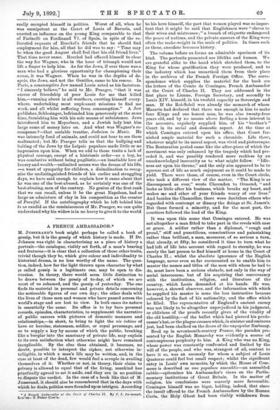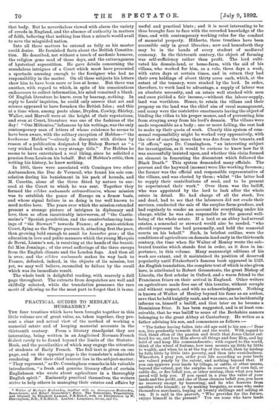A FRENCH AMBASSADOR.*
N. JUBSEBAND'S book might perhaps be called a book of gossip, but it is the gossip of which history is made. If Dr. Johnson was right in characterising as a piece of history a portrait—the catalogue, visibly set forth, of a man's bearing and features—it is clear that a collection of those other traits, trivial though they be, which give colour and individuality to historical drama, is no less worthy of the name. The ques- tion, indeed, how far the light thrown upon character by what is called gossip is a legitimate one, may be open to dis- cussion. In theory, there would seem little distinction to be drawn between the gossip of to-day, of which we are most of us ashamed, and the gossip of yesterday. The one finds its material in personal and private details concerning the noticeable figures of our own day; the other deals with the lives of those men and women who have passed across the world's stage and are lost to view. In both cases its nature is essentially the same. Its office is to lay bare personal records, episodes, characteristics, to supplement the narrative of public careers with pictures of domestic manners and relationships,—in short, to bring to light the vie intime of hero or heroine, statesman, soldier, or royal personage, and so to supply a key by means of which the public, breaking like a burglar into the sanctuary of private life, may explain to its own satisfaction what otherwise might have remained inexplicable. By the clue thus obtained, it becomes, no doubt, possible to interpret the cipher, not otherwise in- telligible, in which a man's life may be written, and, in the case at least of the dead, few would feel a scruple in availing themselves of it. Whether or not, in theory, their claim to privacy is allowed to equal that of the living, mankind has practically agreed to set it aside, and they are in no position to dispute the verdict. In the case of a book like that of Agl- Jusserand, it should also be remembered that in the days with which be deals, politics were founded upon intrigue. According A French Amba,ador e the Court of Charles Ti By I. I. Jn-serand. Lceon : T. Fisher Myr n.
to his hero himself, the part that women played was so impor- tant that it might be said that Englishmen were "slaves to their wives and mistresses ;" a breach of etiquette endangered the peace of nations, and the private amours of the King were often the make-weight in the scale of politics. In times such as these, anecdote becomes history.
The volume before us forms an admirable specimen of its kind. The portraits presented are lifelike and human. We are grateful alike to the hand which sketched them, to the King for whose gratification they were produced, and to the industry which has unearthed them from their place in the archives of the French Foreign Office. The corre- spondence which supplies the material for the book are the letters of the Comte de Cominges, French Ambassador at the Court of Charles II. They are addressed in the first place to Lionne, Foreign Secretary, and secondly to Louis XIV. himself, in his twofold capacity as Sovereign and man. If the Roi-Soleil was already the monarch of whom Mazarin had declared that there was enough in him to make four Kings and one honest man, he was also twenty-four years old, and by no means above feeling a keen interest in the accounts, regularly supplied him, of his " brother's " Court in its social and domestic aspect. At the time at which Cominges entered upon his office, that Court fur- nished ample material for such a chronicle. Life there, whatever might be its moral aspect, was vivid and picturesque. The Restoration period came like the after-piece of which the merriment was only enhanced by the tragedy which had pre- ceded it, and was possibly rendered more reckless by an unacknowledged insecurity as to what might follow. "Idle- ness sat upon his throne," and the only aim appeared to be to squeeze out of life as much enjoyment as it could be made to yield. There were those, of course, even in the Court circle, who took a different view of the matter. "The King is as discomposed as ever," wrote Clarendon to Ormond, "and looks as little after his business, which breaks my heart, and makes nae and other of your friends weary of our lives." And besides the Chancellor, there were doubtless others who regarded with contempt or dismay the doings at St. James's. But these formed a minority, and for the most part, the courtiers followed the lead of the King.
It was upon this scene that Cominges entered. He was not altogether a man fitted to take part in the revels with ease or grace. A soldier rather than a diplomat, "rough and proud," stiff and punctilious, conscientious and painstaking rather than brilliant, a man, moreover, of so serious a turn, that already, at fifty, he considered it time to turn what he had left of life into account with regard to eternity, he was surely the last person to find himself at home in the Court of Charles ; whilst the absolute ignorance of the English language, never even so far surmounted as to enable him to master the names and titles of the men with whom he had to do, must have been a serious obstacle, not only in the way of social intercourse, but of his acquiring that conversancy with the institutions, religion, and literature of the country, which Louis demanded at his hands. He was, however?a shrewd observer, and the information with which he supplied his master is none the less instructive because coloured by the fact of his nationality, and the office which he filled. The representative of England's ancient enemy was not likely to be altogether unprejudiced in his judgment, or oblivious of the proofs recently given of the vitality of the old hostility,—of the bullet which had pierced his prede- cessor's hat, or the plague-crosses which, in sinister and ominous jest, had been chalked on the doors of the unpopular Embassy.
Bred up in seventeenth-century France, the paradox pre- sented by the English Monarchy was evidently a source of contemptuous perplexity to him. A King who was no King, whose power was constantly confronted and limited by the will of the people, and who was, strangest of all, content to have it so, was an anomaly for whom a subject of Louis Quatorze could feel but small respect; whilst the significant entry in Louis' own memoirs, by which the House of Com- mons is described as une populace assembles—an assembled rabble—epitomises his Ambassador's views on the Parlia- mentary institutions of Great Britain. In the matter of religion, his conclusions were scarcely more favourable. Cominges himself was no bigot, holding, indeed, that since the insult offered to the French Ambassadors by the Roman Curia, the Holy Ghost had been visibly withdrawn from
that body. But he nevertheless viewed with alarm the variety of creeds in England, and the absence of authority in matters of faith, believing that nothing less than a miracle would avail to save the misguided nation.
Into all these matters he entered as fully as his master could desire. He furnished facts about the British Constitu- tion. He described, not without a touch of sardonic humour, the religion gone mad of those days, and the extravagances of hysterical superstition. He gave details concerning the scandalous intrigues of a Court which must have presented a spectacle amusing enough to the foreigner who had no responsibility in the matter. On all these subjects his letters show him to have been more or less at home. But there was another, with regard to which, in spite of his conscientious endeavours to collect information, his mind remained a blank. Of English literature he knew, even by hearsay, nothing. In reply to Louis' inquiries, he could only answer that art and science appeared to have forsaken the British Isles ; and this at a time when, among poets alone, Dryden, Cowley, Shirley, Waller, and Marvell were at the height of their reputations, and even at Court, literature was one of the fashions of the day ! "One Miltonius," infamous by his writings, was the only contemporary man of letters of whose existence he seems to have been aware, with the solitary exception of Hobbes—" the bonhomme Hobbes "—already in disrepute with divines by reason of a publication designated by Bishop Burnet as "a very wicked book with a very strange title." For Hobbes he seems to have entertained a real liking, since he solicited a pension from Louis on his behalf. But of Hobbes's critic, then writing his history, he knew nothing.
In 1665, there were associated with Cominges two other Ambassadors, the Due de Verneuil, who found his sole con- solation during his banishment in his pack of hounds, and M. Courtin, alone of the three fitted by nature to suc- ceed at the Court to which he was sent. Together they formed the célèbre ambassade eztraordinaire, whose mission was to establish the peace of Europe on a firmer basis, and whose signal failure in so doing is too well known to need notice here. The years over which the mission extended present a strange picture of intrigues in diplomacy and love, then so often inextricably interwoven, of "the Castle- maine's " Spanish proclivities, and the counterbalancing lean- ings of "the Stewart" towards France ; of a panic-stricken Court, flying as the Plague pursues it, attacking first the poor, then growing bold enough to assail lea honnetes gens ; of the education in love and polite manners which the young Marquis de Berth, Lionne's son, is receiving at the hands of the beauti- ful Miss Jennings ; of the cruel sufferings of the three envoys from the English climate and the London fogs. And then all is over, and the célèbre antbassade makes its way back to France, defeated, indeed, in the objects of its mission, but yet, we may well believe, reconciled to failure by the recall which was its immediate result.
The whole book is delightful reading, with scarcely a dull page throughout. The extracts from despatches are well and skilfully selected, while the translation possesses the rare merit of allowing us for the most part to forget that it is one.



















































 Previous page
Previous page